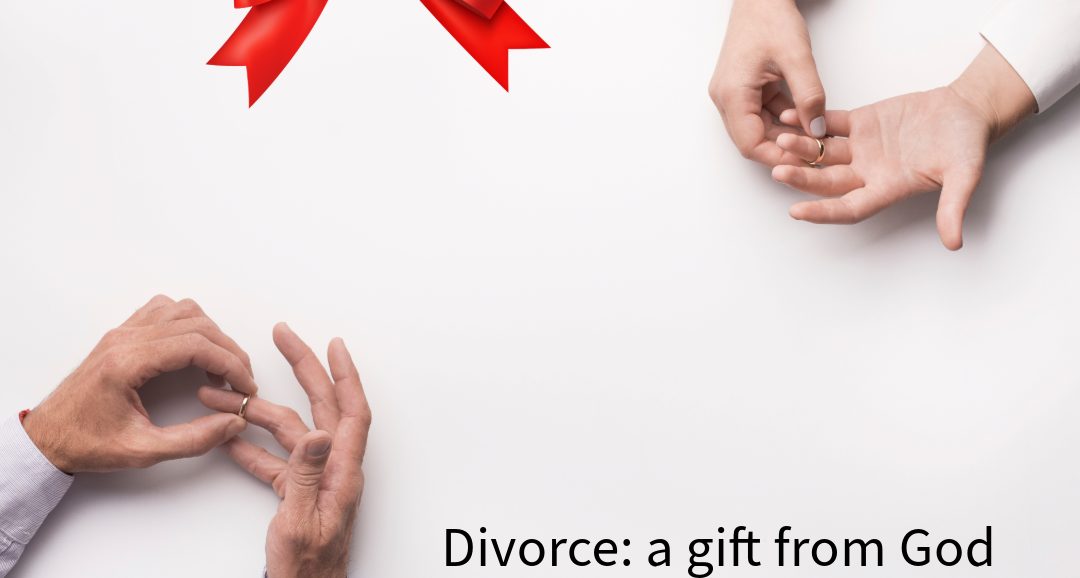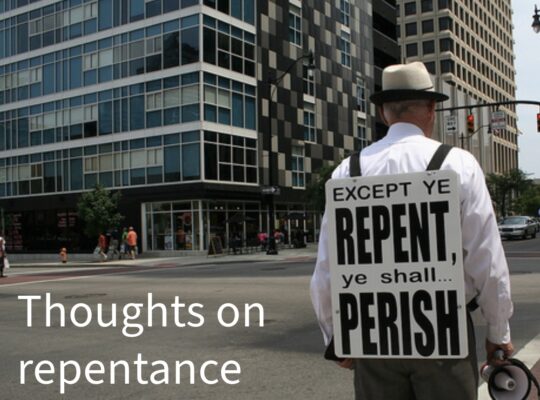In ancient Israel some men would abandon their wives, like discarded possessions, “putting them away” and marrying younger women. Wives who had been “put away” would become mere property as slaves, or would be ignored completely and face destitution, but their obligations to their husband remained, they were not free to re-marry.
Seeing the cruel way men were treating their wives God gave women a gift: divorce. “Suppose a man enters into marriage with a woman, but she does not please him because he finds something objectionable about her, and so he writes her a certificate of divorce, puts it in her hand, and sends her out of his house; she then leaves his house and goes off to become another man’s wife.” (Deut 24:1-2)
Divorce meant that women whose husbands broke their marriage covenant could be given the freedom to remarry. Divorce was not God’s original plan, loving marriage was. Divorce was a gift of grace and mercy to victims of sin. Why? Because God, like any loving parent, cares about our happiness and doesn’t want us to have to suffer because of mistakes we make. In Matthew 19 Jesus reiterates the law from Deuteronomy, saying that “putting away” one’s wife is sinful and that instead Moses had allowed divorce because of man’s hard heart.
Sadly, today some people are still cruel towards their spouse. Divorce is still God’s gift of freedom to those trapped in unloving marriages. God still cares about our happiness. Jesus came so that we would have life, and life in all its fullness.
When I left my husband I was deemed to be at a “very high risk of homicide.” It is no exaggeration to say that I believe my divorce quite literally saved my life. But more than that, it gave me the freedom to start over, to begin again, with hope and God’s grace. It is as a result of God’s gift of divorce to me, that I have the abundant life I have today. Divorce was a good thing for me.
But it nearly didn’t happen: I stayed in my abusive marriage far longer than I otherwise would have, because of my Christian beliefs about divorce, even though those beliefs came with the caveat that divorce was allowed in cases of abuse and adultery.
So why did I stay when I knew it was okay to divorce in cases of abuse? Mostly because I didn’t recognise my husband as an abuser. Like most victims of abuse, I was subject to gaslighting. So I minimised the abuse: it wasn’t that bad, he didn’t mean to, it would get better, it wasn’t the real him, and so on. Ultimately, despite my life being in danger, I didn’t think of my situation as abusive enough to warrant something as extreme as a divorce, which, I believed as a Christian was always a bad thing, only ever a last resort, and even then was shrouded in stigma and shame.
I’m not unusual. As someone who works with Christian survivors of abuse I speak to women day in day out with the same story. When we talk about divorce as a bad thing but with exceptions, most domestic abuse victims only hear that divorce is bad, they don’t see themselves in the exceptions.
When we speak of divorce as acceptable only in particular circumstances we place ourselves as a judge of people’s circumstances. How miserable does someone have to be before they’re allowed a divorce? How abusive does a man have to be before she’s allowed to leave? This is the mess John Piper found himself in years ago when he said that “maybe a woman has to endure verbal abuse for a season and being smacked for a night”
Whether we see our marriage as “abusive” or simply as “unhappy” God’s grace extends to us. If our marriage isn’t working, for whatever reason, if that covenant is broken, then God mercifully gives us divorce, in order that we might be healed and restored. It is the breakdown of the marriage in the first place that is a bad thing, not the divorce. We have to speak about divorce in more positive terms to allow people to be able to access it when they need to.
Recognising divorce as a gift of restoration for those whose marriages have failed does not undermine marriage. It’s the sin that causes the marriage to fail in the first place that undermines marriage. We can, and should strengthen marriage, and we do this by promoting love within relationships, by teaching people before they get married what love looks like in romantic relationships, and what it does not look like. Happily married people are not going to suddenly rush to divorce just because we don’t condemn it, people should stay married because they love each other, not because they are too ashamed to get divorced. We do not strengthen marriage by sacrificing divorcees on the altar of the sanctity of marriage.







